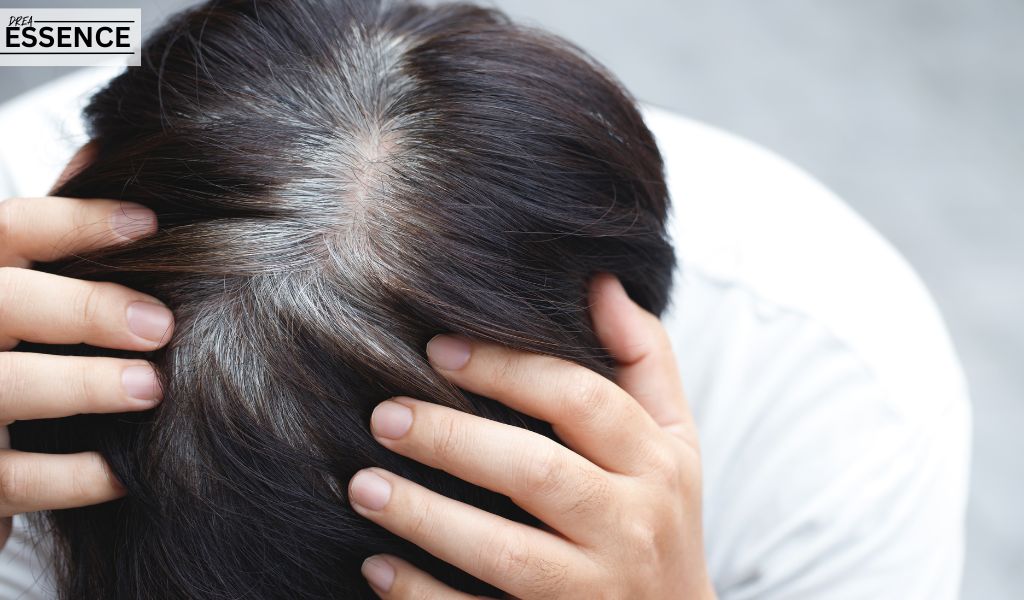In This Post
Noticing white hairs when you’re still young can be a bit unsettling. You might wonder: Why is this happening so early? The truth is, premature greying isn’t uncommon, and a variety of factors contribute to it. From genetics to lifestyle choices, there are multiple reasons why your hair might start turning white earlier than expected. In this blog, we’ll dive into the main causes of white hair at a young age and what, if anything, can be done about it.
What Causes White Hair at a Young Age?
- Genetics
If your parents or grandparents started greying early, chances are, you might experience the same. Genetics is one of the biggest factors when it comes to early greying. Some people are simply more predisposed to turning grey early. This means that, if premature greying runs in your family, your hair follicles may stop producing melanin (the pigment that gives hair its color) sooner than others. - Nutritional Deficiencies
Believe it or not, what you eat plays a huge role in your hair’s health. A lack of essential nutrients—especially vitamin B12, iron, copper, and zinc—can cause premature greying. These vitamins and minerals help maintain healthy hair by supporting melanin production. Without them, your hair may lose its color sooner than expected. If this is the cause, addressing your diet by including nutrient-rich foods might slow down or prevent further greying. - Stress
We’ve all heard that stress can turn your hair grey, and there’s some truth to that. Chronic stress impacts your body’s ability to maintain healthy hair follicles. While stress doesn’t usually cause your hair to turn white overnight, it can accelerate the process by affecting melanin production. Practicing stress management techniques like mindfulness, exercise, or yoga may help slow down the greying process. - Hormonal Imbalances
Your hormones play a big role in your overall health, including the health of your hair. Conditions like thyroid disorders (hyperthyroidism or hypothyroidism) can lead to early greying. If your hormones are out of balance, they can disrupt the melanin production in your hair follicles. Treating hormonal imbalances can potentially prevent further white hairs, but it won’t reverse the ones that are already there. - Oxidative Stress
Oxidative stress occurs when there’s an imbalance between free radicals and antioxidants in your body. This imbalance can damage hair follicles, speeding up the process of greying. Oxidative stress is often linked to environmental factors like pollution or an unhealthy lifestyle, which includes smoking, poor diet, and lack of exercise. Taking steps to live a healthier lifestyle, eat more antioxidant-rich foods, and avoid environmental pollutants can help protect your hair. - Smoking
Smoking doesn’t just affect your lungs—it can also affect your hair. Studies show that smokers are more likely to experience premature greying than non-smokers. The toxins in cigarettes can damage your hair follicles and reduce blood flow to your scalp, which can speed up the aging process. If you’re noticing white hairs and you’re a smoker, quitting might help protect the rest of your natural hair color. - Chemical Exposure
If you frequently use chemical-laden hair products like dyes, relaxers, or bleaches, these can damage your hair follicles and contribute to early greying. Environmental factors, such as pollution and exposure to harsh chemicals in the air, can also affect your hair. Opting for natural hair care products and protecting your hair from pollution may help reduce the risk of premature greying.
Is White Hair at a Young Age Reversible?
In most cases, white hair caused by genetics or aging is permanent. However, if your white hair is the result of nutritional deficiencies, stress, or other lifestyle factors, addressing these issues might slow down the greying process or prevent more from appearing. Here are some things you can do:
- Improve Your Diet: Eating foods rich in B12, iron, zinc, and copper can support healthy hair pigmentation.
- Manage Stress: Incorporating stress-reducing activities like meditation or yoga into your routine may help prevent further greying.
- Quit Smoking: If you’re a smoker, quitting could slow down the greying process and improve your overall hair health.
- Be Gentle on Your Hair: Using fewer chemical products and opting for natural hair care options can help protect your hair from further damage.
While white hair at a young age can feel unexpected, it’s often part of your body’s natural aging process—especially if it runs in your family. If the greying is caused by factors like stress or nutritional deficiencies, making lifestyle changes may slow it down or prevent more from appearing. However, once your hair has turned white, it’s usually permanent. Rather than fighting it, embracing your natural look might just be the most liberating solution!

